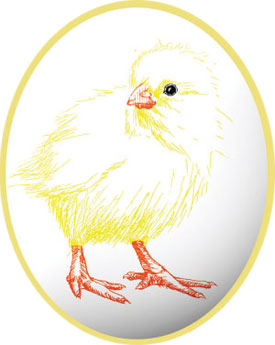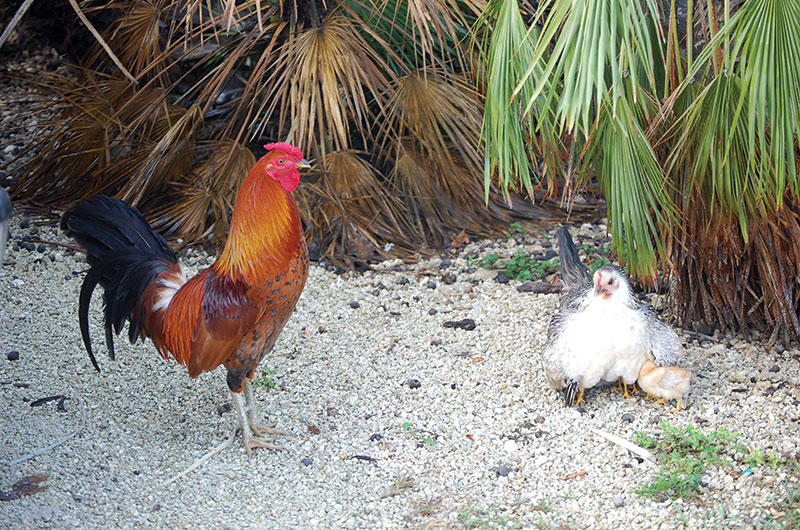The “Easter” Chick - A Lost Soul
By Karen Davis, PhD, President, United Poultry Concerns
This article originally appeared March 28, 2018.
Easter Egg Hunt and Egg Gathering

The association of a hen’s egg with Easter and Spring survives ironically in the annual children’s Easter Egg Hunt, for the origin of this ritual has been largely forgotten.
Traditionally, the finding of eggs was identified with the finding of riches. The search for eggs was part of farm life, because a free hen sensibly lays her eggs in a sheltered and secluded spot. Today’s children hunt for eggs that were laid by a hen imprisoned in a mechanized building, most likely in a wire cage. The widespread disappearance of the home chicken flock in the 1950s ended the gathering of eggs laid by a hen in the place she chose for her nest. Historian Page Smith writes in The Chicken Book, “My contemporaries who have such dismal memories of chickens from the unpleasant chores of their youth had experienced already the consequences of putting living creatures in circumstances that are inherently uncongenial to them.”
Wilbor Wilson provides the background to this change in American Poultry History. He writes: “As the size of poultry ranches increased, the chore of egg gathering became drudgery instead of pleasure. Rollaway nests with sloping floors made of hardware cloth offered a partial solution, but the number of floor eggs increased when the hens did not readily adopt the wire-floored nests. This changed with development of the cage system which left the hen no choice.”

Photo by Davida G. Breier
The Hen as a Symbol of Motherhood
In our day, the hen has been degraded to an “egg machine.” In previous eras she embodied the essence of motherhood. The First Century CE Roman historian and biographer Plutarch wrote of the mother hen in De amore parentis [parental love]: “What of the hens whom we observe each day at home, with what care and assiduity they govern and guard their chicks? Some let down their wings for the chicks to come under; others arch their backs for them to climb upon; there is no part of their bodies with which they do not wish to cherish their chicks if they can, nor do they do this without a joy and alacrity which they seem to exhibit by the sound of their voices.”
In Matthew 23:37, the mother hen is evoked to express the spirit of yearning and protective love: “Jerusalem, Jerusalem, how often have I wished to gather your children together, even as a hen gathers together her chicks.”
The Renaissance writer Ulisse Aldrovandi wrote of mother hens in the 16th century:
They follow their chicks with such great love that, if they see or spy at a distance any harmful animal, such as a kite or a weasel or someone even larger stalking their little ones, the hens first gather them under the shadow of their wings, and with this covering they put up such a very fierce defense – striking fear into their opponent in the midst of a frightful clamor, using both wings and beak – they would rather die for their chicks than seek safety in flight. . . . Thus they present a noble example in love of their offspring, as also when they feed them, offering the food they have collected and neglecting their own hunger.

Photo by Davida G. Breier
The Role of the Rooster
The family role of the rooster is nowadays less well known to most people than the motherhood of the hen. The charm of seeing a rooster with his hens appears in Chaucer’s portrait of Chanticleer in The Canterbury Tales:
This cock had in his princely sway and measure
Seven hens to satisfy his every pleasure,
Who were his sisters and his sweethearts true,
Each wonderfully like him in her hue,
Of whom the fairest-feathered throat to see
Was fair Dame Partlet. Courteous was she,
Discreet, and always acted debonairly.
In ancient times, the rooster was esteemed for his sexual vigor; it is said that a healthy young rooster may mate as often as thirty or more times a day. The rooster thus figures in religious history as a symbol of divine fertility and the life force. In his own world of chickendom, the rooster – the cock – is a father, a lover, a brother, a food-finder, a guardian, and a sentinel.
Aldrovandi extolled the rooster’s domestic virtues:
He is for us the example of the best and truest father of a family. For he not only presents himself as a vigilant guardian of his little ones, and in the morning, at the proper time, invites us to our daily labor; but he sallies forth as the first, not only with his crowing, by which he shows what must be done, but he sweeps everything, explores and spies out everything.
Finding food, “he calls both hens and chicks together to eat it while he stands like a father and host at a banquet . . . inviting them to the feast, exercised by a single care, that they should have something to eat. Meanwhile he scurries about to find something nearby, and when he has found it, he calls his family again in a loud voice. They run to the spot. He stretches himself up, looks around for any danger that may be near, runs about the entire poultry yard, here and there plucking up a grain or two for himself without ceasing to invite the others to follow him.”
A nineteenth-century poultry keeper wrote to his friend that his Shanghai cock was “very attentive to his Hens, and exercises a most fatherly care over the Chicks in his yard. . . . He frequently would allow them to perch on his back, and in this manner carry them into the house, and then up the chicken ladder.”
KAREN DAVIS, PhD is the President and Founder of United Poultry Concerns, a nonprofit organization that promotes the compassionate and respectful treatment of domesticated birds including a sanctuary for chickens in Virginia. Inducted into the National Animal Rights Hall of Fame for Outstanding Contributions to Animal Liberation, Karen is the author of numerous books, essays, articles and campaigns. Her latest book is For the Birds - From Exploitation to Liberation: Essays on Chickens, Turkeys, and Other Domesticated Fowl published by Lantern Publishing & Media. Karen hosts a biweekly podcast series titled Thinking Like a Chicken - News & Views!
Don't just switch from beef to chicken. Go Vegan.
www.UPC-online.org


